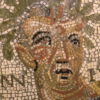Some think they see their own hope to advance
tied to their neighbor’s fall, and thus they long
to see him cast down from his eminence;
Some fear their power, preferment, honor, fame
will suffer by another’s rise, and thus,
irked by his good, desire his ruin and shame;
And some at the least injury catch fire
and are consumed by thoughts of vengeance; thus,
their neighbor’s harm becomes their chief desire.
[E’ chi, per esser suo vicin soppresso,
spera eccellenza, e sol per questo brama
ch’el sia di sua grandezza in basso messo;
è chi podere, grazia, onore e fama
teme di perder perch’altri sormonti,
onde s’attrista sì che ’l contrario ama;
ed è chi per ingiuria par ch’aonti,
sì che si fa de la vendetta ghiotto,
e tal convien che ’l male altrui impronti.]Dante Alighieri (1265-1321) Italian poet
The Divine Comedy [Divina Commedia], Book 2 “Purgatorio,” Canto 17, l. 115ff (17.115-123) (1314) [tr. Ciardi (1961)]
(Source)
Virgil explains to Dante how "bad" love -- love for self, love of another's harm -- can manifest as Pride, Envy, or Wrath toward others, the sins addressed in the first three tiers of Purgatory.
(Source (Italian)). Alternate translations:
Those first the taints, that to their Neighbours' fall
Trust for distinction on this Earthly Ball,
In talents, wealth, or fame, and feed their pride
By the sad sight of others' hopes depress'd,
And o'er their ruin lift a lofty crest,
With Venom from the fount of Good supply'd.
The next that feel this sullen Stygian flame,
Are those, that fear to lose their wealth or fame,
Or any gift, by bounteous Heav'n assign'd;
And long possess'd of Fortune's turning wheel,
In its ascent another name reveal,
That threats to leave them, and their hopes behind.
Another evil thus becomes their good,
And feeds their black desires with Demon food. --
The third are they, who, with the sense of wrong,
Burn inward, or with fell, vindictive Wrath
Pursue their brethren to the Cave of Death,
By love of Pelf, or fiend-like Frenzy stung.
[tr. Boyd (1802), st. 28-30]
There is who hopes (his neighbour’s worth deprest,)
Preeminence himself, and coverts hence
For his own greatness that another fall.
There is who so much fears the loss of power,
Fame, favour, glory (should his fellow mount
Above him), and so sickens at the thought,
He loves their opposite: and there is he,
Whom wrong or insult seems to gall and shame
That he doth thirst for vengeance, and such needs
Must doat on other’s evil.
[tr. Cary (1814)]
There is, in order neighbour to suppress,
Who would excel, himself, his sole desire
Grandeur, that sees another in the mire:
There is who power, grace, and honour, fame,
Still fears to lose, because the rest surpass,
Grows sad, and loves the counteracting cause:
There is who, for injurious affront,
Revenge desires, thirsts for another's pain,
And hence to ill of others must attain.
[tr. Bannerman (1850)]
There are, who, by abasement of their neighbour,
Hope to excel, and therefore only long
That from his greatness he may be cast down;
There are, who power, grace, honour, and renown
Fear they may lose because another rises,
Thence are so sad that the reverse they love;
And there are those whom injury seems to chafe,
So that it makes them greedy for revenge,
And such must needs shape out another's harm.
[tr. Longfellow (1867)]
There is who, through his neighbour being kept down, hopes for excellence, and only for this reason yearns that he may be from his greatness brought low. There is who fears to lose power, grace, honour, and fame, in case another mounts up, wherefore he grows so sad that he loves the contrary. And there is who through injury appears so to take shame that he becomes gluttonous of vengeance; and such an one it behoves that he put forward another's ill.
[tr. Butler (1885)]
There is, who through his neighbour's ruin, so
Hopeth pre-eminence, who hence doth call
That he from grandeur may be cast down low.
There is, who fears to lose power, grace, and all
Honour and fame, because that others rise.
Which grieves him so that he desires their fall.
There is, who seems so hurt by injuries,
That he on vengeance greedily doth brood;
And such a one another's ill must prize.
[tr. Minchin (1885)]
There is he who hopes to excel through the abasement of his neighbor, and only longs that from his greatness he may be brought low. There is he who fears loss of power, favor, honor, fame, because another rises; whereat he is so saddened that he loves the opposite. And there is he who seems so outraged by injury that it makes him gluttonous of vengeance, and such a one must needs coin evil for others.
[tr. Norton (1892)]
There is he who through his neighbour's abasement hopes to excel, and solely for this desires that he be cast down from his greatness;
there is he who fears to lose power, favour, honour and fame because another is exalted, wherefore he groweth sad so that he loves the contrary;
and there is he who seems to be so shamed through being wronged, that he becomes greedy of vengeance, and such must needs seek another's hurt.
[tr. Okey (1901)]
There is he that hopes to excel by the abasement of his neighbour and for that sole reason longs that from his greatness he may be brought low; there is he that fears to lose power, favour, honour, and fame because another surpasses, by which he is so aggrieved that he loves the contrary; and there is he that feels himself so disgraced by insult that he becomes greedy of vengeance, and such a one must needs contrive another's harm.
[tr. Sinclair (1939)]
There is, who through his neighbour's overthrow
Hopes to excel, and only for that cause
Longs that he may from greatness be brought low.
There is, who fears power, favour, fame to lose
Because another mounts; wherefore his lot
So irks, he loves the opposite to choose.
And there is, who through injury grows so hot
From shame, with greed of vengeance he is burned,
And so must needs another's ill promote.
[tr. Binyon (1943)]
Some hope their neighbour’s ruin may divert
His glory to themselves, and this sole hope
Prompts them to drag his greatness in the dirt;
Some, in their fear to lose fame, favour, scope,
And honour, should another rise to power,
Wishing the worst, sit glumly there and mope;
And some there are whose wrongs have turned them sour,
So that they thirst for vengeance, and this passion
Fits them to plot some mischief any hour.
[tr. Sayers (1955)]
There is he that hopes to excel by the abasement of his neighbor, and solely for this desires that he be cast down from greatness.
There is he that fears to lose power, favor, honor, and fame, because another is exalted, by which he is so saddened that he loves the contrary.
And there is he who seems so outraged by injury that he becomes greedy of vengeance, and such a one must needs contrive another's hurt.
[tr. Singleton (1973)]
There is the man who sees his own success
connect to his neighbor's downfall; thus,
he longs to see him fall from eminence.
Next, he who fears to lose honor and fame,
power and favor, if his neighbor rise:
vexed by this good, he wishes for the words.
Finally, he who, wronged, flares up in rage:
with his great passion for revenge, he thinks
only of how to harm his fellow man.
[tr. Musa (1981)]
There is the man who, through the suppression of his neighbour,
Hopes to excel, and for that reason only
Desires to see him cast down from his greatness:
There is the man who fears to lose power, favour,
Honour and glory because of another’s success,
And so grieves for it that he loves the opposite:
And there is the man who takes umbrage at injury
So that he becomes greedy for revenge
And such a man must seek to harm another.
[tr. Sisson (1981)]
There’s he who, through abasement of another,
hopes for supremacy; he only longs
to see his neighbor’s excellence cast down.
Then there is one who, when he is outdone,
fears his own loss of fame, power, honor, favor;
his sadness loves misfortune for his neighbor.
And there is he who, over injury
received, resentful, for revenge grows greedy
and, angrily, seeks out another’s harm.
[tr. Mandelbaum (1982)]
There are those who hope for supremacy through their neighbor’s being kept down, and only on this account desire that his greatness be brought low;
there are those who fear to lose power, favor, honor, or fame because another mounts higher, and thus are so aggrieved that they love the contrary;
and there are those who seem so outraged by injury that they become greedy for revenge, and thus they must ready harm for others.
[tr. Durling (2003)]
There are those who hope to excel through their neighbour’s downfall, and because of this alone want them toppled from their greatness. This is Pride.
There are those who fear to lose, power, influence, fame or honour because another is preferred, at which they are so saddened they desire the contrary. This is Envy.
And there are those who seem so ashamed because of injury, that they become eager for revenge, and so are forced to wish another’s harm. This is Wrath.
[tr. Kline (2002)]
Some hope, by keeping all their neighbours down, that they'll excel. They yearn for that alone -- to see them brought from high to low estate.
Then, some will fear that, if another mounts, they'll lose all honour, fame and grace and power, so, grieving at success, love what it’s not.
And some, it seems, when hurt, bear such a grudge that they crave only to exact revenge -- which means they seek to speed another’s harm.
[tr. Kirkpatrick (2007)]
There is the one, hoping to excel by bringing down
his neighbor, who, for that sole reason, longs
that from his greatness his neighbor be brought low.
There is the one who fears the loss of power, favor,
honor, fame -- should he be bettered by another.
This so aggrieves him that he wants to see him fall.
And there is the one who thinks himself offended
and hungers after vengeance,
and he must then contrive another's harm.
[tr. Hollander/Hollander (2007)]
First, there's the man who aspires to excellence
By pressing down his neighbor: only this yearning
Makes him strive to pull his neighbor to the ground.
Then there's the man with power, favor, and honor,
And so afraid of losing these when someone
Climbs above him, that he hates what once he loved.
And there's the man who, outraged at being insulted,
Lusts for the chance of taking revenge, and rushes
Into wicked plans for hurting others.
[tr. Raffel (2010)]
Quotations about:
animus
Note not all quotations have been tagged, so Search may find additional quotes on this topic.
Whom they fear, they hate. And whom one hates, one hopes to see him dead.
[Quem metuunt oderunt; quem quisque odit, perisse expetit.]
Ennius (239-169 BC) Roman poet, writer [Quintus Ennius]
Fragment 410
(Source)
Quoted by Cicero, De Officiis, Book 2, ch. 7 (sec. 23) [tr. Miller]. Alt. trans.: "Whom men fear they hate; and whom they hate they eagerly wish their destruction." [tr. McCartney (1798)]
He rather hated the ruling few than loved the suffering many.
Jeremy Bentham (1748-1832) English jurist and philosopher
Comment on James Mill
(Source)
In the journal of Caroline Fox (7 Aug 1840), regarding the father of John Stuart Mill. James Mill was a proponent of Bentham's philosophy. The observation was recalled in conversation with John Bowring, Bentham's executor.



